Overview for Guide/Porter Hire for Nar Phu Valley Trek
Hiring a professional guide and strong porter for the Nar Phu Valley Trek is essential for a safe, rewarding, and hassle-free journey through one of Nepal’s most remote and culturally unique trekking regions. A licensed guide not only assists with navigation and logistics but also provides deep insights into the Tibetan-influenced culture, ancient monasteries, and hidden valleys of Nar and Phu.
A porter lightens your physical load, allowing you to enjoy the trek without the strain of carrying heavy gear. Hiring local support also promotes sustainable tourism by directly supporting the livelihoods of mountain communities. Whether you're an experienced trekker or a first-time visitor, hiring a guide is mandatory, and having a porter adds comfort, safety, and deeper value to your Nar Phu Valley adventure.
Nar Phu Valley Trek Overview
The Nar Phu Valley Trek is a hidden gem in the Annapurna region, offering a perfect blend of raw Himalayan wilderness, ancient Tibetan culture, and off-the-beaten-path adventure. Located in the remote northern part of Manang district, this trek takes you through the secluded villages of Nar and Phu, where time seems to stand still. The journey passes through narrow canyons, high cliffs, prayer flag-lined trails, ancient monasteries, and dramatic alpine scenery, giving trekkers a deep cultural and spiritual experience unlike any other in Nepal.
This challenging trek also includes crossing the high-altitude Kang La Pass (5,320m), which rewards you with panoramic views of Annapurna II, Gangapurna, Tilicho Peak, and other towering giants. The Nar Phu Valley Trek is ideal for experienced trekkers seeking a quieter alternative to the busier routes, with opportunities for cultural immersion, high Himalayan adventure, and stunning natural beauty. A restricted area permit and a licensed guide are required, ensuring both safety and cultural respect throughout the journey.
Highlights of Nar-Phu Valley Trek
- Explore the remote and untouched villages of Nar and Phu, rich in Tibetan-influenced culture and tradition.
- Trek through dramatic landscapes, including deep gorges, narrow canyons, and rugged Himalayan terrain.
- Visit ancient Buddhist monasteries, chortens, and Mani walls that reflect the region’s spiritual heritage.
- Cross the challenging Kang La Pass (5,306m) for breathtaking panoramic views of Annapurna II, Gangapurna, and Tilicho Peak.
- Experience authentic Himalayan life far from the busy tourist trails.
- Enjoy peaceful trails and stunning scenery in a restricted area that sees far fewer trekkers.
- Encounter yak herders, highland pastures, and traditional stone-built villages frozen in time.
- Combine adventure, cultural immersion, and natural beauty in one of Nepal’s most secluded trekking routes.
Nar Phu Valley Trek Cost Breakdown
When planning the Nar Phu Valley Trek, several factors affect the total cost, including accommodation, permits, meals, and transportation, guide, and porter services. For our standard itinerary, the total cost is USD 1,100 per person, based on a minimum of 2 participants.
If each cost is broken down individually, the total may appear higher, so we highly recommend that trekkers purchase the full package for the Nar Phu Valley Trek to ensure better value.
Please note that the cost may vary depending on group size, trek duration, transportation options, and the level of service you choose. Below is a general cost breakdown:
Cost for Hiring Guides and Porter for this Trek 2025, 2026
|
Type
|
Cost Per Day (USD)
|
Includes
|
|
Guide
|
$35
|
Lodging, food, and trekking insurance
|
|
Porter Cum Guide
|
$30
|
Lodging, food, and trekking insurance
|
|
Porter
|
$25
|
Lodging, food, and trekking insurance
|
Requre Permits and cost for Nar Phu Valley Trek
The Nar Phu Valley Trek requires two types of permits: a special permit for the Nar Phu Valley and an Annapurna Conservation Area Permit (ACAP). These permits are mandatory to ensure the safety and security of trekkers during the trek. The permit costs are as follows:
Restricted Area Permit (RAP) for Nar Phu Valley Trek:-
- USD 100 per person for all foreign trekkers for the first 7 days, and USD 10 for each additional day. (A one-week permit is usually sufficient for the Nar Phu Valley Trek.)
Annapurna Conservation Area Permit (ACAP):-
- NPR 3,000 per person for all foreign trekkers
- NPR 1,000 per person for SAARC nationals
Trekking in the Nar Phu Valley is not allowed without these permits, so it is important to secure them in advance.
Transportation Costs for Nar Phu Valley Trek:-
The starting and ending points of the Nar Phu Valley Trek are different, so various modes of transportation are required at different stages. The trek begins at Dharapani and ends at Muktinath.
To reach the starting point from Kathmandu, you’ll first need to take transport to Besisahar, and then another vehicle from Besisahar to Dharapani. After completing the trek, you’ll need transport from Muktinath to Pokhara, and then another from Pokhara to Kathmandu.
Transportation costs vary depending on the type of vehicle you choose. The estimated costs are provided below:
Kathmandu to Besisahar:-
- Private Jeep: USD 150 (accommodates 6–7 people)
- Private Car: USD 100 (accommodates 3 people)
- Public Bus: USD 8 per seat
Private vehicles are more expensive than public buses but offer faster, more comfortable, and luxurious travel. Public buses are a more budget-friendly option, though they are less comfortable and slower compared to private transport.
Besisahar to Dharapani:
- Shared Local Jeep: NPR 2,000 per person
- Reserved Local Jeep: NPR 10,000 (accommodates 6–7 people)
If you take private transport all the way from Kathmandu to Dharapani, the cost becomes very high. Additionally, the road conditions between Besisahar and Dharapani are rough. Using a local jeep is a safer option, as local drivers are familiar with the terrain and drive this route regularly.
Muktinath to Pokhara:
- Public Bus: NPR 2,000 per person – Best for budget-friendly travel
- Private Jeep: NPR 30,000 (accommodates 6–7 people) – Faster and more comfortable option
Pokhara to Kathmandu:
There are various transportation options from Pokhara to Kathmandu, such as flights, private cars, private jeeps, public buses, and tourist buses. You can choose based on your budget and time.
- Flight: USD 105 per person – takes approximately 25 minutes
- Private Car: USD 100 (accommodates 3 people) – takes 5–6 hours
- Private Jeep: USD 150 (accommodates 6–7 people) – takes 5–6 hours
- Tourist Bus: USD 10–25 per person – takes 6–8 hours
- Public Bus: NPR 1,000–1,500 per person – takes 7–9 hours
Accommodation and Meal Costs
During the trek, you'll stay in tea house accommodations and have your meals at the same places. While the facilities are basic and slightly more expensive due to the remote location, the overall costs for accommodation and meals are generally reasonable compared to other trekking routes like the Everest Base Camp and Manaslu Circuit.
Accommodation:
Tea house accommodations: USD 5 to USD 10 per night – basic twin-sharing rooms with a blanket, pillow, and bed cover, but no other facilities.
Meals:
Meal cost: USD 5 to USD 10 per meal.
The total cost depends on how much you eat, so it's recommended to budget around USD 20 to USD 30 per day for food, including breakfast, lunch, dinner, and one cup of tea with each meal.
To be safe, you should plan for a daily food and accommodations budget of USD 30 to USD 40 per person.
Extra Cost Considerations for the Nar Phu Valley Trek
In addition to the basic trek budget mentioned above, there are several extra costs to consider during the Nar Phu Valley Trek. Hot showers, Wi-Fi, and device charging are typically not included in the accommodation cost.
- A hot shower usually costs around NPR 500
- Charging a device (like a mobile phone or camera) costs NPR 200 to 400
- Wi-Fi access typically costs NPR 200 to 400 per night
We highly recommend bringing a power bank or a small portable solar panel for charging your devices. It's also wise to buy a local SIM card for phone calls and internet access, and to limit hot showers to save money.
Drinking water, hot beverages (like coffee, hot chocolate, lemon ginger tea), juices, and alcoholic drinks are more expensive in remote areas. Prices vary depending on the item, but usually range from NPR 200 to 700 per item.
Additionally, you may want to donate to monasteries or offer small contributions to tea houses, and it’s customary to tip your guide and porter.
Because of these extras, the overall cost of the Nar Phu Valley Trek may appear higher than expected, so it's important to plan accordingly.
Guide/Porter Hire Service vs. Full Board Package
When planning a trek to Nar Phu Valley, trekkers often choose between two main options: hiring a guide and porter only, or booking a full board package. Each option has its own advantages and is suitable for different types of travelers.
The Guide/Porter Hire Service is ideal for experienced trekkers, budget travelers, or backpackers who prefer flexibility during their journey. This option includes a licensed guide and porter, with their daily wages covering their meals, accommodation, and trekking insurance. However, all other logistics—such as permits, transportation, food, and tea house accommodation—must be arranged and paid for by the trekker.
This option gives you full control over your itinerary, allowing you to decide where to stay and how fast or slow to trek. Costs also depend on your schedule and spending habits. Generally, the cost is lower, with guides charging around USD 35 per day and porters around USD 25 per day. It's a great choice for experienced trekkers or those who enjoy managing their own travel details.
On the other hand, the Full Board Package is a more comprehensive and hassle-free option. It includes everything from arrival and departure in Kathmandu, a professional guide and porter, all necessary permits, transportation, accommodations, and all meals throughout the trek. Additional services such as airport transfers, logistics, and emergency support are also included, making this package ideal for first-time visitors or those who prefer a stress-free trekking experience.
While the price for the full board package is higher, you benefit from a well-organized, worry-free adventure managed entirely by a professional trekking agency. High Pass Adventure offers reliable and experienced staff to ensure a safe and memorable Nar Phu Valley Trek.


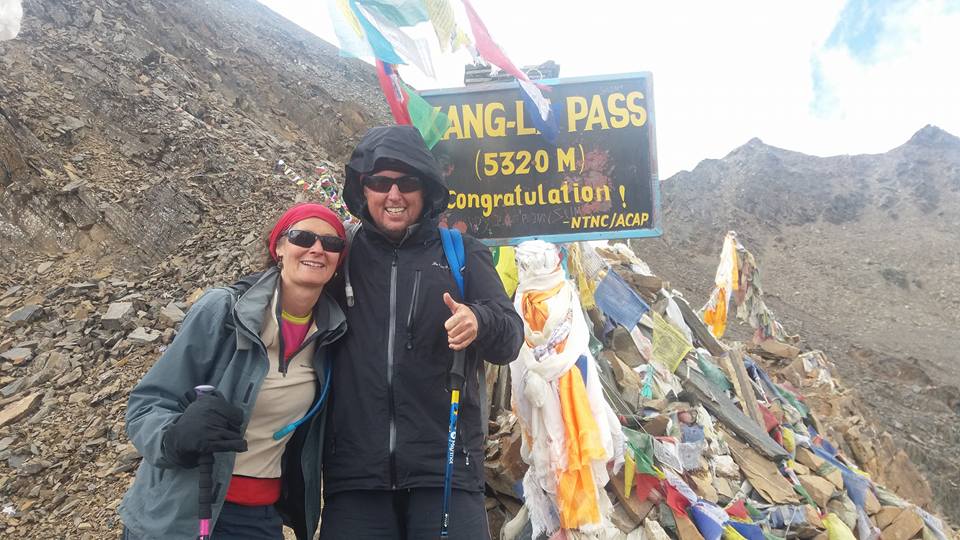

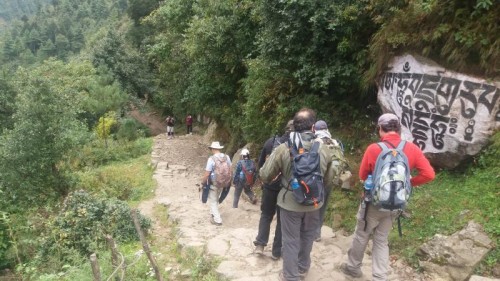

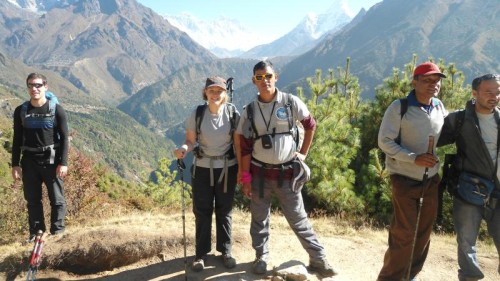

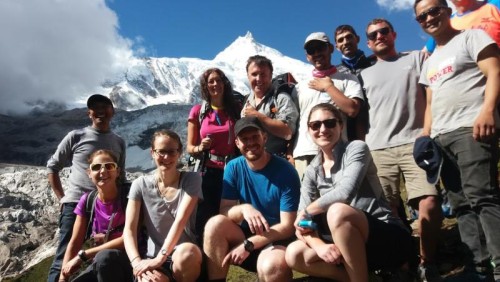
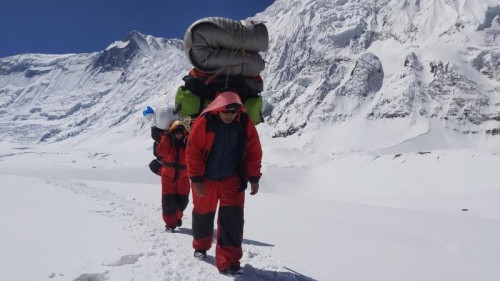
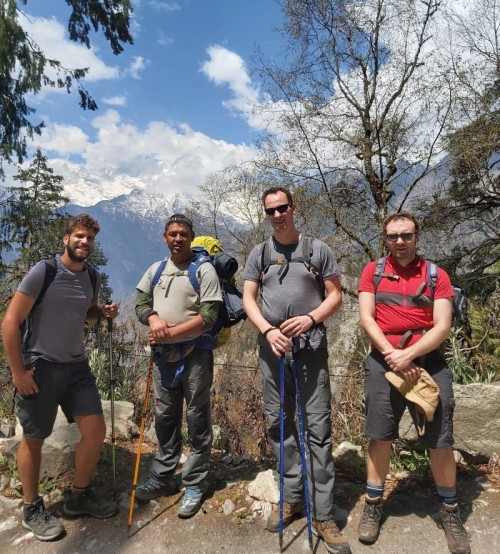

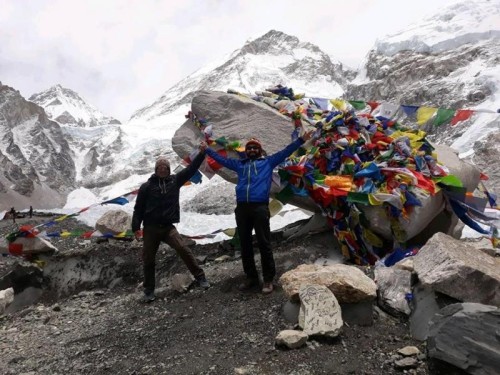
 USD 30
USD 30




Nicole
United States
An Unforgettable Experience Beyond Expectations in the Nar Phu Region
12th July, 2025
My partner and I decided to explore the Nar Phu region and cross the Thorong La Pass on a 14-day trek from Kathmandu to Kathmandu. We found High Pass Adventure on Google and chose them to arrange a guide, porter, and all the logistics we needed. Purna, the owner of the agency, was extremely informative and answered all our questions, which gave us confidence to book the trip with them.
Mr. Ganesh was our guide, and Tika was our porter. They made our trek truly wonderful and hassle-free. Ganesh used his knowledge of the region to adjust the originally planned route based on our physical ability and the actual trail conditions. Their support made us feel safe and well taken care of throughout the entire journey.
We are already planning to return. It was an unforgettable vacation for us!
Thank you, High Pass Adventure team — especially Purna and Ganesh!